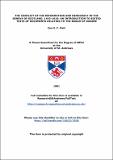Files in this item
The conflict of the Reformation and democracy in the Geneva of Scotland, 1443-1610 : an introduction to edited texts of documents relating to the Burgh of Dundee
Item metadata
| dc.contributor.advisor | Cameron, James K. | |
| dc.contributor.author | Flett, Iain E. F. | |
| dc.coverage.spatial | viii, 193 | en_US |
| dc.date.accessioned | 2012-07-27T08:51:55Z | |
| dc.date.available | 2012-07-27T08:51:55Z | |
| dc.date.issued | 1981 | |
| dc.identifier.uri | https://hdl.handle.net/10023/3028 | |
| dc.description.abstract | This thesis is an introduction to a collection of edited texts concerning the course of the Reformation in Dundee, taking as a starting point the negotiations which led to the agreement between the Abbey of Lindores and the Town of Dundee concerning the burgh church in 1442/3, and as a conclusion the successful appointment of James Gleg, the nominee of the Trades of Dundee, as Schoolmaster. The starting point is significant as an expression of ecclesiastic individualism by the Town Council, an individualism which in turn nurtured a religiosity which was to provide a receptive atmosphere for reformed thought. The conclusion is also significant as an expression of individualism by the Trades of Dundee, who recognised the importance of education in continuing the impetus of reformed thought in the town, and established their share of control over that education although they lost their rights to representation on the Town Council. The successive waves of Lutheran and Calvinist influence from Europe are considered through the trading links of Dundee with the continent, together with the effect of the successive English and French military occupations of the area. Domestic influences are also considered, such as the sympathies and relative political power of the local landed and merchant classes during the upheavals of the regencies of Queen Mary and of James VI. As the growth of reformed opinion affected a sympathetic local gentry and prosperous merchant oligarchy through the dissemination of printed text and university education, so a growth of religious and political consciousness followed in the burgh Crafts through popular song and drama and through preaching. Fifty years after the political impetus to the Scottish Reformation, it was the Trades of Dundee who were intent on maintaining the purity of reformed education. Finally comparisons are made between the course of the Reformation in Dundee, in the other burghs in Scotland, and in the Reformed Cities of Europe. Despite fundamental differences in the background and nature of the Reformation in Dundee and other areas, it is concluded that Dundee was a typical Scottish Reformed burgh in its awareness of its responsibilities to discipline the population, to educate the young and to care for the poor. It was unfortunately like Geneva in that the progress of democracy suffered in both after the respective figureheads of Provost Haliburton and of Calvin retired from the scene. | en_US |
| dc.language.iso | en | en_US |
| dc.publisher | University of St Andrews | |
| dc.subject.lcc | BR789.D9F6 | |
| dc.subject.lcsh | Reformation--Scotland--Dundee | en_US |
| dc.subject.lcsh | Dundee (Scotland)--Church history | en_US |
| dc.title | The conflict of the Reformation and democracy in the Geneva of Scotland, 1443-1610 : an introduction to edited texts of documents relating to the Burgh of Dundee | en_US |
| dc.type | Thesis | en_US |
| dc.type.qualificationlevel | Masters | en_US |
| dc.type.qualificationname | MPhil Master of Philosophy | en_US |
| dc.publisher.institution | The University of St Andrews | en_US |
This item appears in the following Collection(s)
Items in the St Andrews Research Repository are protected by copyright, with all rights reserved, unless otherwise indicated.

